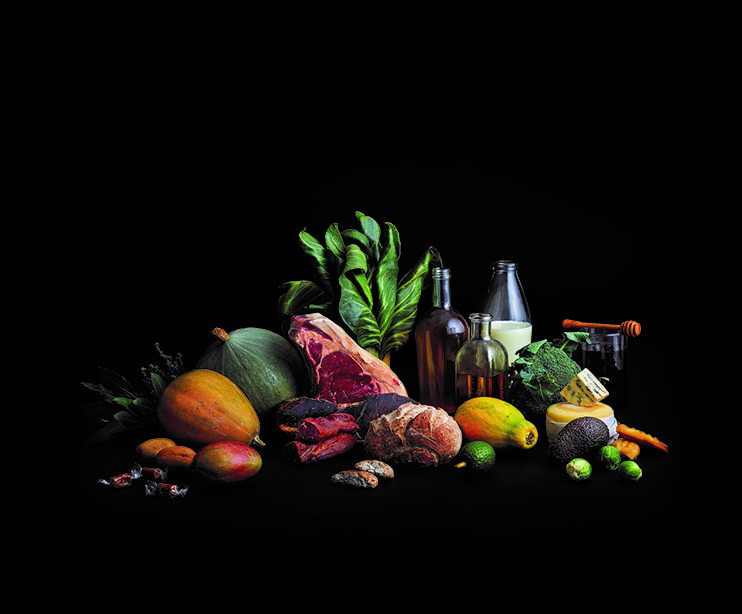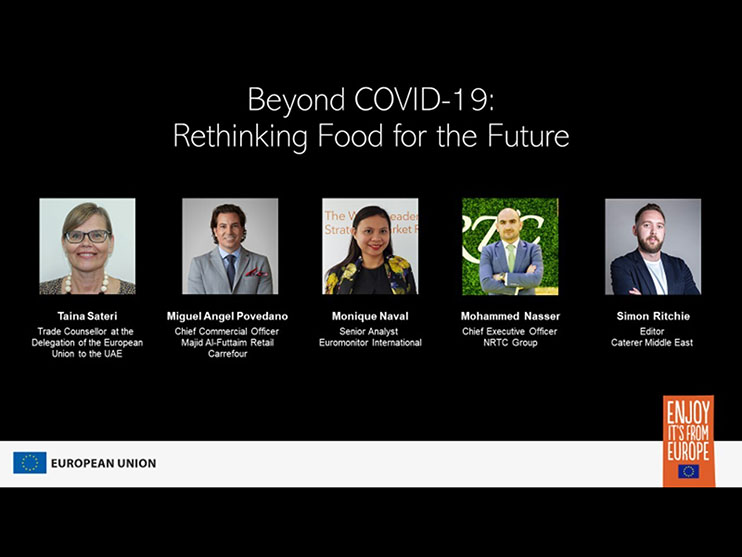News - News In Brief
EU agri-food exports to GCC increase as COVID-19 accelerates consumer demand for healthy and traceable fresh produce
June 7, 2020
.jpg) Advertisement
AdvertisementWhen it comes to F&B exports to the GCC region, the COVID-19 crisis has stressed the need for open trade, international safety standards and greater industry collaboration to address the challenges of a more sustainable global food system. This was the view of expert panelists gathered for the European Union’s webinar: “Beyond COVID-19: Rethinking Food for the Future.”
Organised by the EU as part of its More Than Food communication campaign, the event was held last week and was attended by more than 150 F&B industry professionals from the GCC region.
Panelists included: Taina Sateri, Trade Counsellor at the Delegation of the European Union to the UAE; Miguel Angel Povedano, Chief Commercial Officer, Majid Al-Futtaim Retail; Monique Naval, Senior Analyst Euromonitor International; and Mohammed Nasser, Chief Executive Officer, NRTC Group. The session was moderated by Caterer Middle East editor Simon Ritchie.
Discussion focused on the impacts of COVID-19 on consumer demand and food related businesses across the GCC, as well as what the European Union is doing to ensure the region is supplied with high quality and safe agri-food products.
According to Euromonitor International, the GCC countries have fared well in terms of adequate food supply, helped in part by national food security measures put in place well before the crisis. However, the pandemic has accelerated the implementation of these measures to secure supply chains and saw immediate action centred around four main response nodes of business continuity, labour planning, logistics and communication.
“Post the initial response, governments, alongside key modern retail in the region, are working on securing strategic stock levels for a period of one year and ensuring logistical challenges are mitigated by implementing measures such as reduction of custom fees and digital solutions to updating documents such as bills of lading. Food supply chains are likely to be fundamentally altered in the future as localism gains prominence. But this needs to be balanced against growing consumer preference for healthy, nutritious and high-quality food imports,” explained Monique Naval.
European Union farm exports to the GCC during the height of the coronavirus pandemic have sufficiently met the needs of the region, growing 25% in the first quarter compared to Q1 2019.
“This huge growth is testament to the good coordination between the respective EU and GCC authorities as well as the EU’s ability to respond with a resilient supply chain,” said Taina Sateri.
“Our priority has always been to ensure EU farm exports are high quality, safe, healthy, nutritious and authentic in taste. We offer access to the food pantries of 27 member states so we can reliably meet the growing consumer demand for fresh produce,” she added.
This reliability is critical for retailers like Carrefour. According to Miguel Angel Povedano, provenance and traceability will become even more vital to consumers’ purchasing decisions in the future.
“With regards to products coming from the EU, it is imperative that we ensure steady supply and focus on the core strengths of food products that represent value, especially around quality. Our data indicates that people want to know about the origins of their food, how it is produced, and the journey it took to reach them. For this reason, we believe better technology like Blockchain and Artificial Intelligence will be crucial factors in improving the visibility and traceability of goods coming from the EU in the future.”
Miguel Angel Povedano added: “Carrefour is a bridge connecting the EU to 16 markets in this region and can play a bigger role in the future too. As a company, we maintain a long-term vision and seek to develop lasting partnerships with all our suppliers. With that in mind, new opportunities exist for EU companies to establish relationships with buyers in the GCC, and buyers will continue to have a strong need for reliable, high-quality produce coming from the EU.”
As one of the region’s leading importers and exporters of fruit and vegetables, NRTC Group has witnessed a 200% increase in consumer demand for fresh and healthy produce.
“We have definitely seen a shift in consumer buying as it has become more focused on healthy, fresh produce and, to a certain extent, increase of purchasing from known safe sources of fresh produce, like Europe. COVID-19 has brought into focus the health and safety of the entire food system so it is understandable that consumers will seek out products that they think have the highest hygiene standards in place,” said chief executive Mohammed Nasser.
Panelists agreed, the biggest challenge facing GCC countries will be how to balance the import and local production of fresh produce to adequately and sustainably meet their needs and the shifting demands of consumers.
Taina Sateri concluded: “The EU has always advocated for open trade and the current crisis has reinforced the importance of this, especially the prudent need for advancement of international safety standards. We are pleased that the strict hygiene rules that already govern the production of food in the EU have worked effectively to protect our food business operators from the virus responsible for COVID-19, and that EU exports to the GCC have been able to continue to grow with no interruption of trade. Further resilience will be achieved by us working more closely with all stakeholders to transition to a sustainable food system.”
Those sentiments were shared by audience attendees. When polled about what matters most to them when purchasing EU agri-food products, 72% said safety and quality matters more than price. Just how ready are GCC consumers to embrace food sustainability was a hot question posed by audience members to the panel. Panelists agreed sustainability is a motivating factor for more conscious consumers in the region, evidenced by the increasing interest in fresh, plant-based products from the EU.




.jpg)










